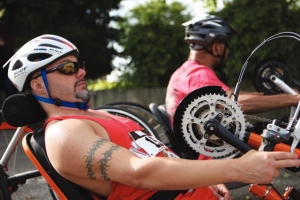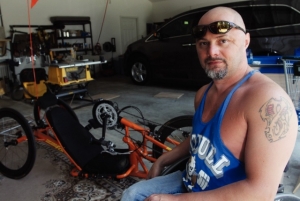Pedal shows his mettle
By Kenneth Fine
Published in News on May 24, 2013 1:46 PM

News-Argus/CASEY MOZINGO
Kevin Tenney checks his gears at the starting line of the 21K hand cycling race during the Valor Games at the North Carolina State Fairgrounds on Thursday.

News-Argus/MICHAEL BETTS
Former airman Kevin Tenney was paralyzed in a automobile accident while on leave in 1993, but he has not let that slow him down. This week he competed in the Valor Games in Raleigh in hand cycling and table tennis.
RALEIGH -- He pumped his arms for more than an hour -- stopping only in short bursts when the blood rushing to his head made him dizzy.
He didn't quit when the seemingly endless inclines exhausted his upper body -- when the sun beating down on his face began taking its toll.
For Kevin Tenney, there was never a question about whether he would complete the 21K handcycling competition that unfolded at the Valor Games at the North Carolina State Fairgrounds Thursday afternoon.
Giving up, after all he has been through, simply isn't an option.
He knows what real adversity is -- having stared it in the eyes some 20 years ago when, after returning from Operation Desert Storm, a car crash left him paralyzed.
It was July 7, 1993.
Kevin was only 19.
"There was the aftermath," he said, looking at a photograph of his mangled truck. "The engine was almost in the passenger seat."
"I laid there on the ground for eight hours before anybody found me. If it hadn't been for me knocking one of the trees over, I'd probably still be out there. It fell in a guy's driveway, and when he went out to move the tree, he just happened to look over and saw my truck -- then me. I was down a 20-, 30-foot drop off."
Kevin would spend the next six months in a West Virginia hospital.
"The only thing they didn't have to sew back together inside of me was my right lung and my right kidney," he said. "They had me open for 14 hours."
And when doctors determined that he would never walk again -- that he wouldn't be able to use any muscles below his chest -- he coped, fairly quickly, with those realities.
"They said I was pissed for a while, but I don't remember it. All I remember was being like, you feel bad or you don't," he said. "You either feel sorry for yourself or you don't."
And that same mantra has guided him for the nearly two decades he has spent in a wheelchair.
"There are gonna be a lot of things that happen. You'll wake up and have not good days. There will be days when everything will aggravate you," Kevin said. "You'll have good days and bad days, and in the beginning, it feels like a lot of bad days. But when you can see somebody with the same injuries as you -- or even somebody worse off than you -- doing stuff, you say, 'Oh. I guess there are things I can do if I stop lying here crying.'"
So when he isn't training for, and competing in, events exclusive to wounded warriors, he takes that message on the road.
He talks to military servicemen and women who have just suffered injuries both at home and in theater.
"We try to let people know that when they first get injured, life doesn't end," Kevin said. "When you get injured, you don't know what's out there. I didn't know that you could drive a car. It's stuff like that. People think, 'Well, I'm paralyzed. I'm not gonna be able to do anything.' So I like to tell people, 'You can do this. You can do that.'"
And he likes being there to listen to their stories -- to continue the legacy of camaraderie he first experienced as a young airman stationed at Seymour Johnson Air Force Base.
*
His event had concluded, but Kevin remained along the track.
"In a little bit, I'm gonna go check on my man over there," he said, looking over at a double-amputee who was icing his shoulders in a shady spot after his own battle with the Raleigh course. "Man, going up those hills was a beast."
The toll they took on Kevin revealed itself when, after nearly an hour-and-a-half in that cycle, he pulled himself into his wheelchair.
"The worst part about it is once you stop for a long period ... you tighten up," he said.
But, as he has since the day of the wreck that changed his life, he blew off the pain and moved on.
"You know what, I think I'm gonna go sit in the sun for a while," he said, a smile creeping across his face. "Yeah. Just lay back."
